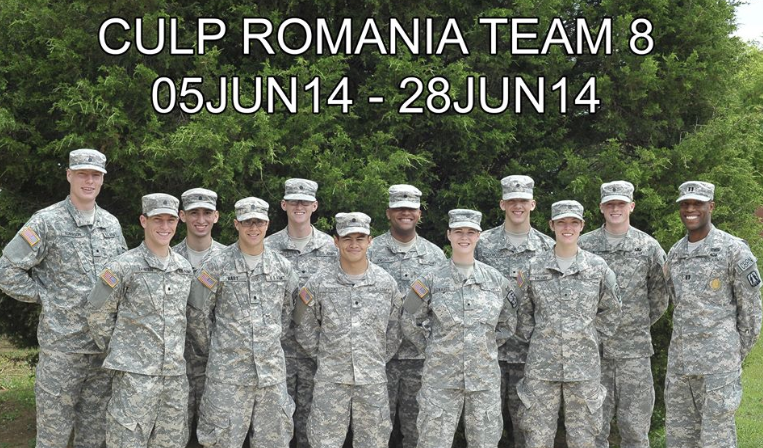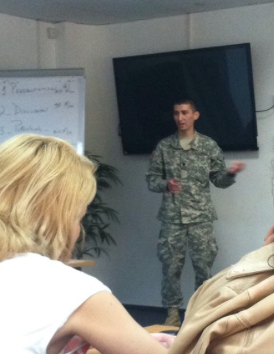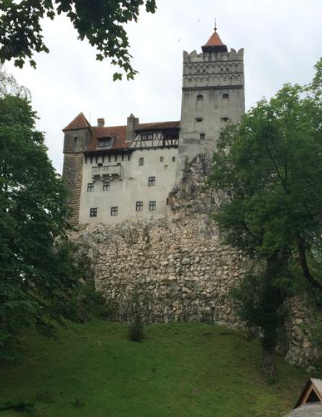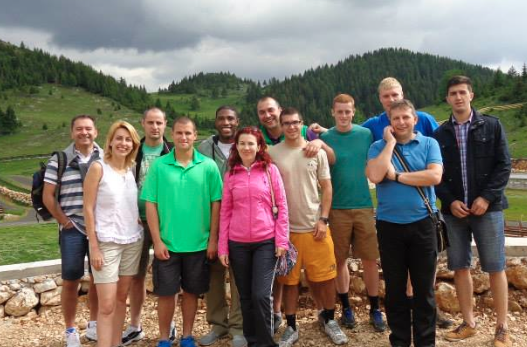Cultural Understanding in Romania
NewsBy: Cadet Curtis Hart
Each summer about 1,200 Army ROTC Cadets from across the nation are afforded the opportunity to travel around the world thanks to the Army’s Cultural Understanding and Language Proficiency (CULP) program. Cadets may apply to go to one of 40+ countries to be immersed in its culture while becoming a better leader. Furthermore, Cadets may choose to train with a foreign military, to help with humanitarian aid, or to teach English.

Picture 1: Cadets and Cadre from around the nation assemble at Fort Knox prior departure.
On May 31, I flew to Louisville, KY to begin my CULP trip. Army ROTC is headquartered at Fort Knox, just a short drive from the Louisville airport. I needed to get a few shots, do some paperwork and get acquainted with my team before departing to Bucharest, Romania a few days later. My team consisted of 11 Cadets from around the country as well as one cadre leader who would be in charge of us for the upcoming trip. Also, we had a director of instruction (DOI) with us to facilitate teaching English since none of us had done so before.
On June 5, we flew from Louisville to Bucharest, Romania after stopping in Miami and Zurich. Soon after landing we were driven to our hotel, which was located in the heart of Bucharest. For the next two days we learned how to properly teach English; also, we got settled in the hotel we would be staying at for the next three weeks. Our mission was simple: improve the conversational English skills of the SRI agents while learning about their culture and history. SRI is Romania’s equivalent to America’s FBI. SRI is an acronym that stands for Romanian Intelligence Service and they focus on national security issues.
At first, teaching these people seemed like an extremely daunting task. There were about 30 of them and most of them had a law degree or a PhD. After the first few days of teaching, however, we realized that we were the subject matter experts and that there was no need to be intimidated by their advanced education and experience. We created PowerPoint presentations that focused on American history and culture to spark conversations, all of which were to be spoken in English, which illustrated the similarities and differences between America and Romania. This allowed us to execute both pillars of our mission simultaneously: teach them English while learning about their culture and history.

Picture 2: Cadet David Castro, Illinois State University, teaches SRI employees about American culture.
Teaching only lasted from 9:00 to 3:30 Monday through Friday. This allowed us ample time to explore Bucharest during the week and the rest of Romania on the weekends. While exploring Bucharest we were able to see how typical Romanians lived their lives and how it was different than we do. Also, we were able to see the People’s Palace, the Romania parliament building. It is the largest administrative building in the world and was built under the reign of Ceaușescu, the nation’s last communist dictator.
On the weekends we visited the cities of Brasov, Sibiu, Transylvania, and Constanta. We were able to explore fortified villages, see historic churches, and swim in the Black Sea. In my opinion, the most notable place we visited was Bran Castle in Transylvania. This is where Bram Stoker’s Dracula took place.

Picture 3: Bran Castle, Transylvania.
The three weeks in Romania went very quickly and before we knew it, it was time to return home. We flew from Bucharest to Frankfurt, Germany where we spent the night. The next morning, we flew back to Louisville after a short layover in Charlotte, North Carolina. When we returned to Fort Knox we had two days of paperwork, medical exams, and briefs standing between us and returning home.

Picture 4: Cadets, Cadre, and SRI employees in the mountains of central Romania.
This trip showed me how different other cultures are compared to our own. It showed me the negative effects communism could have on a person. The older people who grew up under communist rule generally seemed depressed while the younger generation seemed very happy. All of them, however, were excited to teach us about their country’s history and were delighted that we wanted to learn. As a future Army officer, this expedition taught me the importance of cultural awareness and sensitivity.

